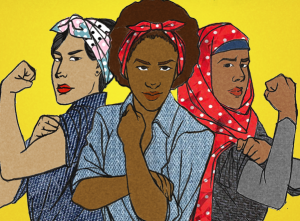This article originally appeared on Medium and was republished here with the author’s permission.
When Netflix first brought Friends in its entirety to its streaming service on January 1, 2015, my husband and I spent about seven or eight months watching it all the way through from Rachel leaving Barry at the altar to “She got off the plane!”
There’s something uniquely comforting about the ’90s classic sitcom. It’s funny, it’s familiar, it’s a bit fantastical (a bunch of absurdly good-looking 20-somethings on the Upper West Side in enormous apartments who almost never seem to actually work? Sure. Also, they each date like 50+ people over the show’s 10-year run, so).
But it’s also easy to watch. It doesn’t hit you in the feels too often, and even when it does, it’s handled with gentle humor (babies being born, weddings, breakups). It’s not serious, and it’s not heavy, and sometimes you just want to escape into a world as simple as theirs.
In the past few months, we’ve started watching it again, putting a few episodes on when we’re vegging out or killing time and don’t want to have to pay much attention. After all, we know what’s going to happen by now!
But this time through, we’ve noticed something we don’t like so much about Friends and other sitcoms: the way they handle relationships.
In a nutshell, sitcoms tend to perpetuate what I’ve seen termed “toxic monogamy.” I’ll use Friends as the prime examples since I’m so familiar with it, but I’m sure you’ll see the same patterns in other shows.
Example 1 — “We were on a break!”
Ross and Rachel date for about a year. Their relationship ends when Ross becomes jealous of Rachel’s spending time with a good-looking co-worker who helped her get the job in the first place. Rachel tells Ross she thinks they need to take a “break” from each other.
Ross promptly goes out drinking and dancing and ends up sleeping with “the hot girl from the copy place.” Rachel comes by the next morning to talk to Ross, finds out he’s had sex with someone else, and declares that he has cheated on her and that they’re done.
Ross insists that since they were “on a break,” he wasn’t cheating and it shouldn’t be held against him. This “we were on a break” catchphrase continues throughout the show, years after the event.
There are two issues to parse here. The first is that Ross is jealous because Rachel is talking to her coworker, Mark. Ross decides that Rachel must be attracted to Mark, and that fact that she’s talking to him must mean that she’s going to cheat on him with Mark.
He becomes ridiculously jealous, doesn’t give Rachel the benefit of the doubt, and ends up causing a big fight and break up. First of all, Rachel doesn’t give Ross any reason to think she doesn’t love him or that she intends to cheat. Second, Ross doesn’t trust Rachel to be faithful and instead assumes that she can’t control herself around a cute guy. Why doesn’t Ross trust his girlfriend? And why doesn’t he just talk to her about it and accept her at her word?
The second issue is the question of whether Ross cheated on Rachel by having a one-night stand with the copy girl. To Rachel, this is unforgivable. How could he do this to her? They weren’t broken up, and therefore he was unfaithful, the exact thing Ross accused Rachel of!
But why does having sex with someone else when your current monogamous relationship status is uncertain mean an automatic breakup? And why does it continue to be such a big deal for years afterward?
Example 2 — Ross and Joey compete over Gabrielle Union
Ross leaves Central Perk and sees a beautiful woman named Kristen (Gabrielle Union) unloading a moving truck. He offers to help her take the boxes up to her apartment and asks her out on a date. Later, Joey meets the same woman in the same way and also makes a date with her.
Chandler realizes Ross and Joey have both started dating the same woman, and Ross and Joey immediately begin competing for her. Their rivalry becomes so ridiculous that when Joey shows up at the restaurant where Ross and Kristen are on a date, Joey and Ross find more and more horrible things to say about each other, and Kristen gets up and leaves them both.
Again, there are a few things to unpack here. First of all, Ross and Joey cannot stand the idea that they are both dating the same woman. This theme appears in other sitcoms as well, and it occurs several times throughout the series, whereby two men who are good friends end up in bitter competition over a woman.
Why can’t Kristen date them both, if everyone is happy that way? It’s not like she’s on a date with both of them at the same time. It may be that down the line, it turns out there’s a deeper connection with one of the men than the other, and the relationship will become exclusive at that point. Or, she may find that it was fun while it lasted, but she doesn’t like either of them enough to make it a long-term thing.
Ross uses his higher income and education to try to counter Joey’s charm and good looks (and prowess in bed), and the result is disastrous for both of them. Instead of them both dating a beautiful woman that they both like, their competition becomes so bitter that Kristen becomes disgusted with them both, and their friendship is threatened.
Secondly, why isn’t it up to Kristen to decide who she dates? The desires of the woman in question are never considered when Ross and Joey start fighting. It’s all about which of them is a better man for her, not which of them she likes.
They are making assumptions about what she’s looking for in a man, about why she likes them, and about what her intentions are in the short- and long-run. They behave in an incredibly immature fashion, and Kristen was absolutely right to dump them both.
There’s a somewhat parallel episode where Phoebe is dating two men at the same time, a fireman and a kindergarten teacher, and she’s having trouble choosing. They don’t know each other, but when they find out she’s been dating both of them, they’re both pretty upset about it and both dump her.
Here, Phoebe should have been honest with the two men that they weren’t exclusive, and that early in a relationship, she didn’t necessarily have to pick one of them to continue with. Again, she could date both and see which one she clicks better with, if either.
Example 3 — Chandler loves Joey’s girlfriend
Joey is dating a fellow actor named Kathy, and when Chandler meets her, he falls madly in love with her. He holds back, not wanting to disrupt his best friend’s relationship, but eventually it becomes clear that Joey and Kathy are drifting apart and there’s a definite spark between Kathy and Chandler. They kiss, and before Joey finds out about the kiss, he and Kathy break up.
Chandler feels terrible about betraying Joey like that and eventually ‘fesses up, at which point Joey declares that he and Chandler are no longer friends. Chandler comes up with a bizarre way to get Joey to forgive him, and he and Kathy date for a while quite happily.
Then Chandler goes to see Kathy in a play and goes into a jealous rage when he sees her kiss her costar on stage, convinced that she’s cheating on Chandler with her costar. She insists she’s not and wonders why Chandler would think that of her, and he points out that she has a history of cheating on her boyfriend. They break up.
Obviously, it was not cool of Chandler to intrude on his friend’s relationship, but there was a much simpler way to handle the whole thing. He could have told Joey that he has feelings for Kathy and let Joey and Kathy decide what to do next. Joey had a right to feel some jealousy and betrayal toward Chandler for breaking his trust like that.
However, Chandler’s inability to take Kathy at her word that she was not cheating on him is another example of the man not trusting the woman’s word or her self-control. His reaction is ugly, immature, and insulting.
***
Similar themes and others occur throughout the show and in many other sitcoms. Think about how many times you’ve seen the following used as the premise of an episode:
- Jealousy is used as a measure of how characters love each other.
- Talking to someone attractive is tantamount to cheating.
- Friends have to compete with each other to impress someone they’re both interested in.
- Women can’t be trusted to make their own decisions about relationships.
- Men can’t be trusted to “keep it in their pants.”
- Men are afraid of commitment, while women just want to get married and settle down and have babies.
- Men and women can’t be friends without some sexual tension or without hooking up at some point.
None of this is to say that monogamy is wrong or undesirable. But in these cases, monogamy is used as a weapon and seen as something that is constantly threatened, rather than as an agreement between two people who love each other and want to love only each other.
The prevalence of these themes in popular shows and movies teaches us a very negative version of monogamy and relationships.
Love should be measured by the people involved making each other better than they would be apart, by mutual respect and understanding, by shared values and goals, by trust, and not by how jealous you can make each other by flirting with other people, or by proving that you can avoid the “temptation” of an attractive person, or by testing each other’s “faithfulness.”
[do_widget id=’text-101′]
Madison Barry is a wife, mother, and small business owner who self-publishes BDSM-themed erotic fiction in her spare time. She writes about her own experiences with sex-positivity, monogamy and non-monogamy, and BDSM topics on her Medium blog.
Search our 3000+ articles!
Read our articles about:
Our online racial justice training
Used by hundreds of universities, non-profits, and businesses.
Click to learn more




















